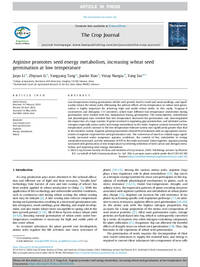Arginine promotes seed energy metabolism, increasing wheat seed germination at low temperature

Authors:
Low temperatures during germination inhibit seed growth, lead to small and weak seedlings, and significantly reduce the wheat yield. Alleviating the adverse effects of low temperature on wheat seed germination is highly important for achieving high and stable wheat yields. In this study, Tongmai 6 (insensitive) and Zhengmai 113 (sensitive), which have different low-temperature sensitivities during germination were treated with low temperature during germination. The transcriptome, metabolome and physiological data revealed that low temperature decreased the germination rate, downregulated the expression of a large number of genes involved in regulating glycometabolism, and inhibited carbon, nitrogen (especially amino acids) and energy metabolism in the seeds. Arginine content increased at low temperature, and its increase in the low-temperature-tolerant variety was significantly greater than that in the sensitive variety. Arginine priming experiment showed that treatment with an appropriate concentration of arginine improved the seed germination rate. The conversion of starch to soluble sugar significantly increased under exogenous arginine conditions, the content of key metabolites in energy metabolism increased, and the utilization of ATP in the seeds increased. Taken together, arginine priming increased seed germination at low temperature by relieving inhibition of seed carbon and nitrogen metabolism and improving seed energy metabolism.
